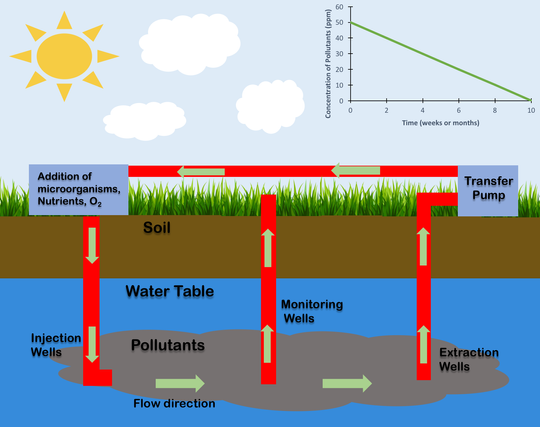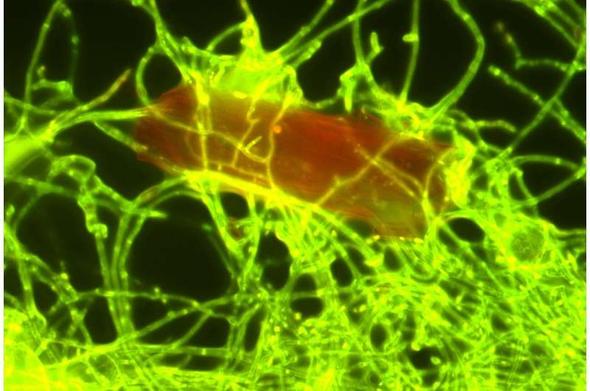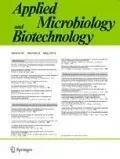Harnessing Sewage Sludge Microbiota from Wastewater Treatment Plants for Tetrachloroethene Detoxification. #wastewater #microbiota #bacteria #biodegradation https://pubs.acs.org/doi/full/10.1021/acsestengg.4c00900
#Biodegradation
Harnessing Sewage Sludge Microbiota from Wastewater Treatment Plants for Tetrachloroethene Detoxification. #wastewater #microbiota #bacteria #biodegradation https://pubs.acs.org/doi/full/10.1021/acsestengg.4c00900
#Bacteria found to eat #forever_chemicals, and even some of their #toxic byproducts.
#bioremediation #PFAS #PFOS #biodegradation #Labrys
https://phys.org/news/2025-01-bacteria-chemicals-toxic-byproducts.html
In situ bioremediation (Microbiology 🦠)
Bioremediation is the process of decontaminating polluted sites through the usage of either endogenous or external microorganism. In situ is a term utilized within a variety of fields meaning "on site" and refers to the location of an event. Within the context of bioremediation, in situ indica...
https://en.wikipedia.org/wiki/In_situ_bioremediation
#InSituBioremediation #Microbiology #Biotechnology #Biodegradation #Bioremediation #BiodegradableMaterials
Study identifies #fungus that breaks down ocean plastic
https://phys.org/news/2024-06-fungus-ocean-plastic.html
#Biodegradation of #polyethylene by the marine fungus Parengyodontium album https://www.sciencedirect.com/science/article/abs/pii/S0048969724029668
"A fungus living in the sea can break down the #plastic polyethylene, provided it has first been exposed to UV radiation from sunlight. Researchers expect that many more plastic degrading #fungi are living in deeper parts of the #ocean."
Incorporating high-temperature-resistant bacterial spores into plastic increases its strength and flexibility -- which are just side effects of making it self-biodegrading when exposed to moisture and nutrients.
https://www.sciencealert.com/this-new-plastic-disappears-when-you-dont-need-it-anymore
Probably not good for food storage, then.
New publication by alumnus of the @hanseias Raeid Abed of Sultan Qaboos University et al.: "Functional and structural responses of a halophilic consortium to oily sludge during #biodegradation", in: Applied #Microbiology and #Biotechnology https://link.springer.com/article/10.1007/s00253-023-12896-4
Exploring the unseen: #Microbial wonders in Earth's saltiest waters https://phys.org/news/2024-02-exploring-unseen-microbial-earth-saltiest.html
Unravelling #biosynthesis and #biodegradation potentials of #MicrobialDarkMatters in #hypersaline lakes https://www.sciencedirect.com/science/article/pii/S2666498423001242
"This research not only expands our knowledge of life in extreme conditions but also opens exciting possibilities for new technologies and medical breakthroughs, leveraging the untapped resources of these unique microbial communities."
#Recycle #Plastic #Enzymes #Food #Environment
“…with #plastic production doubling every 15 years. The relatively low cost of #petroleum based polymers encourages their single use and #overconsumption. Synthetic plastics are recalcitrant to #biodegradation, and #mismanagement of plastic waste leads to their accumulation in the #ecosystem, resulting in a disastrous #environmentalfootprint.
https://www.annualreviews.org/doi/10.1146/annurev-chembioeng-092120-091054
#Systems designed to support #biodiversity do not drive monocultural #landscapes. #Regenerative systems prevent #nonnativespecies from skewing the balance of #ecological communities. They do not deteriorate terrestrial or #marine areas that #nativespecies depend on.
A #biodiverse #ecosystem provides #water, #food, #cleanair, #carbonstorage, #temperature regulation, #biodegradation, and #stormwater mgmt while buffering against #disease transmission and #climate extremes.
In situ bioremediation (Microbiology 🦠)
Bioremediation is the process of decontaminating polluted sites through the usage of either endogenous or external microorganism. In situ is a term utilized within a variety of fields meaning "on site" and refers to the location of an event. Within the context of bioremediation, in situ indica...
https://en.wikipedia.org/wiki/In_situ_bioremediation
#InSituBioremediation #Microbiology #Biotechnology #Biodegradation #Bioremediation #BiodegradableMaterials
Oil eating #microbes reshape droplets to optimize #biodegradation https://phys.org/news/2023-08-oil-microbes-reshape-droplets-optimize.html
#Alcanivorax borkumensis #biofilms enhance #OilDegradation by interfacial tubulation https://www.science.org/doi/10.1126/science.adf3345
"Initially, upon converging on a droplet, a sphere formed—but then finger-like protrusions formed, radiating out from the sphere, each completely covered with #bacteria. The result was much faster, more efficient consumption of the droplet."
Two species of #bacteria, Desulfovibrio aminophilus and Sporomusa sphaeroides, have been discovered to have the ability to digest some polyfluoroalkyl substances (#PFAS), specifically chlorinated PFAS.
https://e360.yale.edu/digest/bacteria-break-down-pfas-forever-chemicals
The article references this resesarch paper: https://www.nature.com/articles/s44221-023-00077-6
#pollution #remediation #EnvironmentalRemediation #environment #ForeverChemicals #contamination #bioremediation #groundwater #SoilScience #biodegradation
Some historical context: wood contains a polymer called lignin, which acts like the concrete in reinforced concrete (cellulose is the rebar). It's very difficult to degrade too, but some fungi found a way about 300 million years ago. Eventually some microbe or other will very likely find a way to exploit the massive amount of degradation-resistant plastics we've buried, but I wouldn't like to bet on timescales...
The Molecule of the Month at the RCSB Protein Data Bank is a great resource for learning about enzymes and other proteins - it's written in a way that should be accessible to bio(logy|chem) undergrads and to motivated high-school students. This month's entry is about a couple of enzymes that have evolved in bacteria that can break down 2 common plastics - acrylic^H^H polyester (PET) and nylon (polyamide)
https://pdb101.rcsb.org/motm/277
#StructuralBiology #Enzymes #Teaching #Plastics #Biodegradation
Thanks @MerveTepe
Best of luck with reviews for all these manuscripts. Presume you've heard of the following society on #biodegradation and #biodeterioration : https://ibbsonline.org/
I presented at one of their meetings around ten years ago in Lodz, Poland - it's a supportive and friendly community.
Very impressive.
#Bioinformatics based #Bioprospecting to identify #hydrolase enzymes with #plastic #PET (polyethylene terephthalate) #biodegradation capabilities.
This new research in #NatureCommunications allows identification of novel hydrolases from four bacterial phyla with expressed enzymes showing activity across pH4.5 to 9 and from 30 to 70 degrees C.
Evidently, it is bad to leave apple cores or banana peels by the side of nature trails: https://www.mnn.com/lifestyle/responsible-living/stories/it-ok-toss-apple-core-or-banana-peel-outside I am on the fence about this still: it seems like this could put nutrients back in the soil. Thoughts? #nature #environmentalism #stewardship #biodegradation


